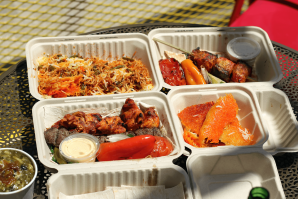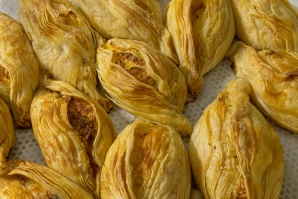Beer has been illegal in Iran since the Islamic Republic rose to power in 1979 — but against the long history of brewing in the region, this half-century interruption barely registers. Chemical analysis proves that the lands that are now Iran have been brewing beer longer than anywhere in Europe; archaeologists there have found traces in jars more than 5,000 years old.
The craft continued into 20th-century Iran with industrial breweries like Argo and Shams, but these were shuttered or destroyed in the years surrounding the revolution. To follow the story of Persian beer, one must look beyond the borders of the country. The latest chapter takes place in Davis, home of Rostam36.
Rostam36, made at Dunloe Brewing in Davis, wears its Iranian identity discreetly, but it has a clear message to share if you know where to look. The bearded man on the front of the can, accessorized with a Wagnerian helmet and drinking horn, is not a Norse god but Rostam, the Persian hero who stars in the Shahnameh, a 10th-century epic poem. 36 is a code in Kalphabet36, a numerological system created by the beer’s founder, Karan Khoshcar, that translates Persian and English phrases into digits. It means “payam jaan,” which he translates as “the message of love and life.”
“I wanted to make a beer for a cause,” says Khoshcar, who formerly ran the popular restaurant Stand Up Kabob from 2019 to 2025. That restaurant, which Comstock’s profiled in 2023, also ran on a cause. Signs from the Woman, Life, Freedom protests, a feminist movement sparked by the death of Mahsa Amini at the hands of Iran’s morality police, hung on the walls alongside scenic views of old Tehran and stick-figure doodles of Khoshcar with his two daughters. “Our cause is to change the light in which Iranians are portrayed in the world,” he told Comstock’s in 2023.
Karan Khoschar grills tomatoes at his restaurant Stand Up Kabob
in 2023. (Photo by Jennifer Fergesen)

At the time, Khoshcar was already a year deep in the preparations to launch his beer label. He spent much of 2022 traveling around Europe to find the perfect formula, his travels corresponding with the peak of the Woman, Life, Freedom movement. The protests drew him with an urgency tied to his personal experience. Born in Iran, he escaped the country with his family in the aftermath of the revolution and arrived in California as a teenager in the 1980s. He wants his two daughters to have full rights when they visit the country of his birth.
Khoshcar took a bus to Berlin to participate in one of Europe’s largest protests — close to 100,000 people, according to organizers’ estimates — in the midst of his beer research trip. The two experiences became intertwined in his mind. “I kept thinking, what can I do to unite the people without a leaflet, where they can look at it and then throw the leaflet away and forget about the cause of women’s rights in Iran?” he says. “So I figured I could use this product as a vehicle.”
Turn the can to the back and you’ll see a smaller drawing of another man, the ends of his beard tangled with a woman’s hair. Squint and you’ll recognize the profile: it is Ayatollah Khamenei, the supreme leader of Iran since 1989. “I tucked his beard down and connected it to a woman’s hair to show that his beard and the woman’s hair have just as much right of being out,” Khoshcar says. “No one should force a woman to wear a hijab if they don’t want to cover their hair, and if that’s the case, then he shouldn’t be able to show his beard.”
He acknowledges that putting an overtly political image on a commercial product is a risky decision. “That’s why I’m asking other businesses that want to support freedom for Iran to also stick their neck out. If I took a risk and I’m still here, maybe they could take a risk too.” One option, he says, is to put the code 1331 on their products — “Women, Life, Freedom” in Kalphabet36.
Rostam36 cans are labeled at Dunloe Brewing in Davis. A drawing
of Ayatollah Khamenei is visible on the back of the label. (Photo
courtesy of Rostam36)

Like the messages on the can — unveiled when you know the code — the Persian flavors in Rostam36 are subtle, but distinct once you understand them. At its base, the beer is a classic pilsner, inspired by the original Czech formula Khoshcar tasted in the town of Pilsen and the more hops-forward German versions. Wafting in the foreground is a floral strain that dulls the bitter edge of the hops. This scent is narenj (bitter orange) blossom, the flower of a quintessentially Persian citrus that appears in poetry almost as often as it does in cuisine. It is available on tap at Maydoon in Sacramento and in cans at stores and bars around the Capital Region and Bay Area.
Khoshcar is currently working with Dunloe Brewing to create another beer that he calls a “Persian elite red lager.” Tinted red with saffron and beets, it will come in a Champagne bottle decorated with a quote from 12th-century poet Nizami Ganjavi: “pāyān-e shab-e siyāh sepid ast,” or “The end of the dark night is bright.”
Karan Khoschar, center, with his daughters Daria, left, and Emily
shortly before Daria’s wedding in July 2025. (Photo courtesy of
Rostam36)

It is a hopeful proverb for the current moment, as relations remain tense after an ostensible ceasefire between Israel and Iran. “It’s time to consider supporting the people of Iran,” Khoshcar wrote by email in the days after the U.S. strikes on Iranian nuclear sites.
He looks forward to a future in which he can move Rostam36 production to a democratic, economically open Iran, helping the country pick up the threads of its 5,000-year brewing history. “That’s the wish I’ve always had, to be able to create jobs in Iran,” he says.
–
Subscribe to the Comstock’s newsletter today.
Recommended For You

Neighborhood Favorite: Stand Up Kabob
A Persian restaurant at a Davis car dealership aims to support the Iranian women’s revolution
There are many clues that Stand Up Kabob, a Persian restaurant
literally welded onto the side of a used car dealership on the
outskirts of Davis, is no ordinary kebab shop.

Neighborhood Favorite: For the Love of Malta
Maltese pastizzi comes in two classical forms, delineated by how the finely fissile pastry — laminated with both butter and lard — folds around its savory filling. Shell-shaped pastizzi, clamped tight like clams at low tide, conceal peas cooked to their melting point and spiced with a subtle curry that’s more English (Malta’s most recent colonizers) than Indian.

Neighborhood Favorite: Caravan Uzbek Cuisine
The Capital Region gets its first Uzbek food truck
Every morning, Caravan Uzbek Cuisine co-owner Farkhod Soatov
wakes up early to make plov. The rice and meat dish, with
roots in Persian pilaf, has changed little since the days of the
Silk Road.

The Great Migration
From immigrants fleeing their countries to Bay Area residents escaping high prices, the culture of the Capital Region is changing
Just under 2.4 million people live in the Sacramento-Roseville-Folsom metropolitan area, an increase of roughly a quarter since the turn of the century.



